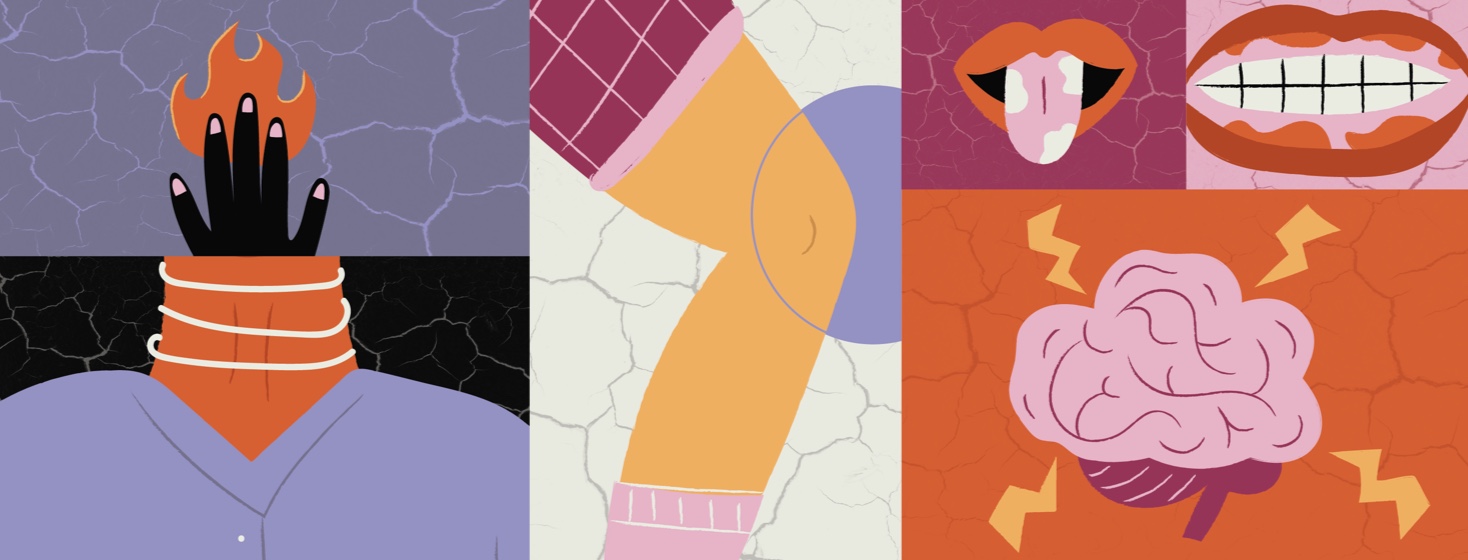Are These Weird Symptoms Caused By Endometriosis?
As I've entered my late 30s, my pre-period symptoms have gotten pretty bizarre. I can't tell what's causing them, but experts think endometriosis-related pain is neuropathic and neuroinflammatory. That means inflammation can get in your nerves. In turn, that affects how your brain processes sensations.1
A lot more research is needed to figure this out, but I know one thing for sure: my nervous system goes awry when my progesterone goes up. That's the 10-12 days before my period starts, otherwise known as the luteal phase. Research shows progesterone — which is usually anti-inflammatory — can increase inflammation in people with endometriosis.2
Here are some of the weirdest things that happen to me.
Abnormal sensations
There are a couple of medical terms for this. One is paresthesia. That's usually a sudden non-painful, weird feeling like "pins and needles" or numbness. I also get certain kinds of dysesthesia. That's when an ordinary stimulus — like my husband touching my lower back — is painful.
These are common with conditions that affect nerves. That includes diabetes and multiple sclerosis (MS). In MS, it's caused by damage to your brain and spinal cord. You can get MS lesions that disrupt how your nerves send signals. That can affect how your muscles move or how your brain interprets stimuli.
I have no idea if endo lesions and inflammation are causing problems, or if my central nervous system is just getting signals wrong. But here's what some of my symptoms feel like:
- Burning. This happens in the tips of my fingers, usually in my left hand. It's not like they're on fire. It's more like the burning sensation that happens when I go outside on a cold day without my gloves on.
- Numbness. Out of nowhere, I can lose feeling in my thumb or large sections of my thighs or knees. This usually only happens for a couple of minutes.
- Brain zaps. Simply put, it feels like I get a quick electric shock or an ice pick jabs my brain. It may or may not hurt, but it happens so fast that I don't really register it until it's over. It's not the same as a migraine, but I get those too.
- Itchiness. I have eczema and my skin is allergic to pretty much everything, but this is different. It's like my body itches or "crawls" from underneath. This tends to happen anywhere that I get what I call extra-pelvic endo pain: diaphragm, pelvis, shoulder.
- Skin pain.My skin can hurt when I put on clothes, take a shower, or come into contact with something even moderately cold — like a laptop on my legs. The medical term for this is allodynia. This symptom is way worse in winter, which isn't great since I live in Wisconsin.
Throat tightness
Sometimes my throat will contract for no reason. I have to stop talking when it happens. Your throat can spasm when there's something amiss with the signal that comes from your basal ganglia and other parts of the brain that control movement. That can cause a medical condition called spasmodic dysphonia,3 but I don't know if that's what's I have.
Mouth sores
I get red patches on my gums or inner cheeks. It feels like I've stuck hot peppers in my mouth. My dentist thinks it's "burning mouth syndrome". She said it might be caused by a central nervous system problem, stress, or an allergy. In short, she has no idea. Changing to a mint-free toothpaste helped them go away, tough.
Recently, I've started getting painless white patches under or on the sides of my tongue. They show up right before my period. A quick Google search says this could be leukoplakia, which happens in other inflammatory conditions. I don't know if that's what's happening, but I get a lot GI inflammation near my period. And the mouth is part of that system.
Is it more than endometriosis?
None of my doctors really know what's triggering my symptoms. I can't get anyone to check for extra-pelvic endo lesions, and no one thinks I have cancer or MS. Their general consensus is that my central nervous system is overly sensitive and a little glitchy.
I think they're at least partly right about the central sensitization. Research shows that the brains of people with chronic pelvic pain and endometriosis are different than people who are endo or pain-free. The central nervous system can reorganize and amplify its cries for help. You get pain for seemingly no reason or that pain is more intense.1,4
What will I do next?
There are some antidepressants that target the central nervous system, but I haven't tried those yet. Instead, I'm keeping a schedule of my symptoms and triggers to see if I can manage without drugs. If I start to feel worse — or my symptoms get in the way of my daily life — I'll check in with my doctor or a neurologist to make sure there's nothing more serious going on.

Join the conversation